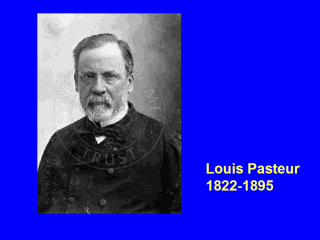 |
It would be useful
to discuss each of them, but in the interests of brevity I will focus on
just one, Louis Pasteur (1822-1895). This French chemist evolved into a
bacteriologist, and was a towering figures of 19th century bacteriology and
preventive medicine. In 1854, he had recently been appointed professor of
chemistry in Lille, and was invited to solve the problem of aberrant
fermentation of beer that caused it to taste bad and made it undrinkable. He
showed that the problem was caused by bacteria that were killed by heat. In
this way he invented the process for heat treatment to kill harmful
bacteria, first applied to fermentation of beer, then to milk – the process
known ever since as pasteurization, that has saved innumerable children from
an untimely death. He went on to study and solve many other bacteriological
problems in industry and animal husbandry. He developed attenuated vaccines,
first to prevent chicken cholera, then in 1881, to control anthrax, which
was a serious threat to livestock as well as an occasional human disease.
Before this, in 1880, he began experiments on rabies, seeking a vaccine to
control this disease, which without treatment is invariably fatal.
Following the success of the anthrax vaccine he believed that an
attenuated rabies vaccine could be made. This, of course, was many decades
before the virus was visualized. He successfully tested his rabies vaccine
in 1885 on a boy, Joseph Meister, who had been bitten by a rabid dog.
Pasteur became not just a national but an international celebrity. He
visited Edinburgh, and played a part in initiating actions that led to the
creation of the Usher Institute. |
